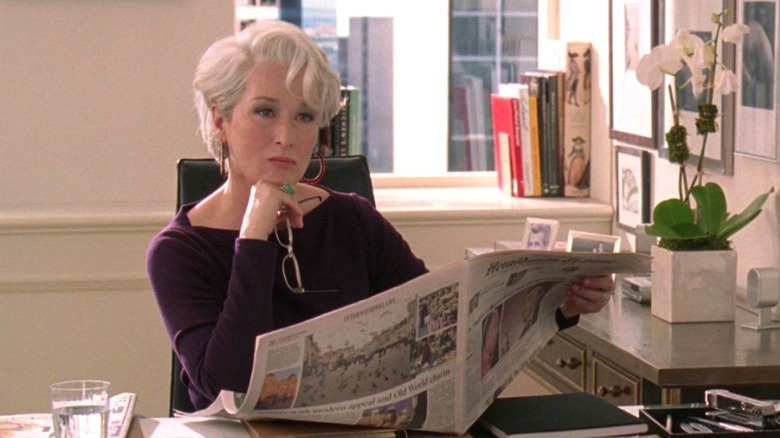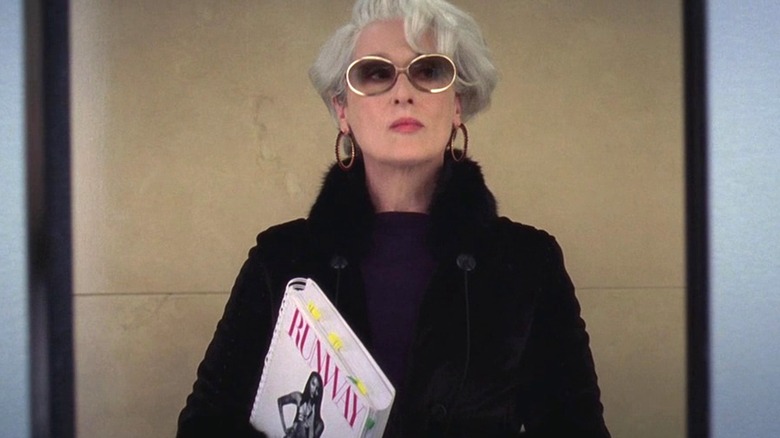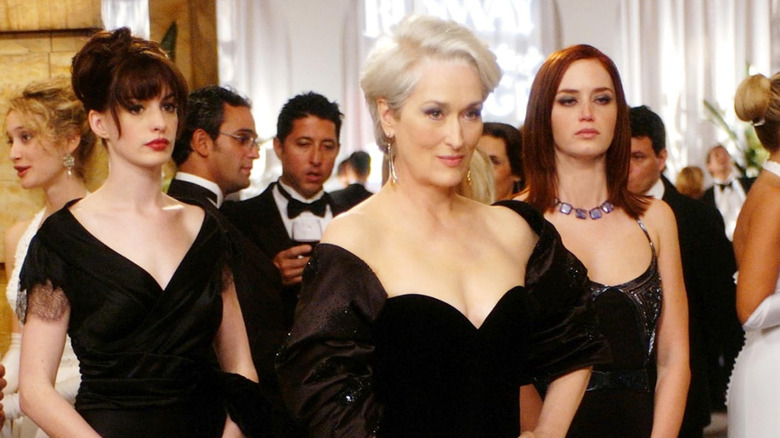How Anna Wintour Really Felt About Meryl Streep's The Devil Wears Prada Role
There are some absolutely terrifying bosses in the history of cinema, but Meryl Streep as Miranda Priestly in "The Devil Wears Prada" has to be among the most intimidating. She's the editor-in-chief of the fictional "Runway" fashion magazine, and she's impetuous, demanding, and wildly cruel. That makes life an absolute hell for her employees, especially her brand-new junior personal assistant, aspiring journalist Andy Sachs (Anne Hathaway). As utterly nightmarish as Miranda is, she's also kind of impressive, and Streep's performance is among her best (and that's truly saying something — this woman is a powerhouse!).
When watching "The Devil Wears Prada," however, it's hard not to wonder how much Miranda was inspired by long-time "Vogue" editor-in-chief Anna Wintour, and not just because both are high-powered fashion magazine editors with blunt attitudes.
Lauren Weisberger, the author of the novel "The Devil Wears Prada," actually worked as an assistant for Wintour before writing her novel based on how she felt about "Vogue" office culture, though she has denied that Miranda is based directly on her former boss. Streep has similarly denied that she's trying to make a caricature of Wintour, though it's hard to deny that there are elements of the famous "Vogue" editor's personality that seem pretty strongly reflected in Miranda's behavior. But what did Wintour herself think of the whole thing? Her perfectly characteristic response was pure Anna Wintour and honestly pure Miranda Priestly, too.
Anna Wintour was completely unconcerned with The Devil Wears Prada
According to author Amy Odell in "Anna: The Biography" (via Entertainment Weekly), Wintour was pretty unconcerned about the entire thing and even allegedly told a "Vogue" editor at the time that she didn't even remember who Weisberger was upon learning about her novel. Big ouch, but that sounds exactly like the kind of thing Miranda might say about Andy, whether she remembered her or not, so it's kind of funny. While most of her colleagues have described Wintour as more "bemused" with the movie than anything, there are hints that at least some of the portrayal stung. Odell's description of the premiere, attended by both Wintour and Weisberger, paints a slightly more complex picture:
"[Director David] Frankel sat behind Anna and [Wintour's daughter] Bee. Anna had a seat at the end of the row and, though she had a habit of dashing out of plays that bored her, watched the whole movie. At one point, Bee turned to her and said, 'Mom, they really got you.'"
While there's really no sicker burn than your own kid telling you that a movie nailed your whole (semi-villainous) vibe, Wintour was pretty mum about the movie for the most part. She told "60 Minutes" that the movie was "was not a true rendition of what happens within this magazine" and was simply "entertainment." Thankfully, she has shown a sense of humor as time has gone on, even sitting down for a one-on-one interview with Streep, where she joked with the actor about her "most difficult role." I'm going to be honest, that almost sounds like too much powerful energy for one interview, but these two titans kept it classy and showed everyone why they're both legends in their own way.
Streep made some sizeable changes to her role in order to take it on, including giving the character a vital moment of vulnerability. It's hard to imagine "The Devil Wears Prada" working without Streep's one truly raw moment, letting her be human, so maybe Wintour recognized that. Or maybe game just recognizes game.
The complex women of The Devil Wears Prada gave the movie depth
"The Devil Wears Prada" didn't do anything tremendously groundbreaking with its story, but one place where it shone was in allowing its female characters to be genuinely messy and complicated. While most of the main characters get at least one or two moments where you're really supposed to empathize with them, none of them are the kinds of people you would really want to be close to. They're all self-serving, career-obsessed, and willing to be capricious and cruel as a means of survival in a dog-eat-dog business world that's even harder to navigate as a woman than as a man, fashion industry or no. The industry has pitted them against one another, and while they definitely figure this out to some degree, there's also a sequel in the works, so they couldn't have learned that much about playing nice, could they?
Wintour may have only been loosely the inspiration for Miranda, but Streep's interpretation of the character and star power helped make "The Devil Wears Prada" into the classic it is today. She made being mean look good.


